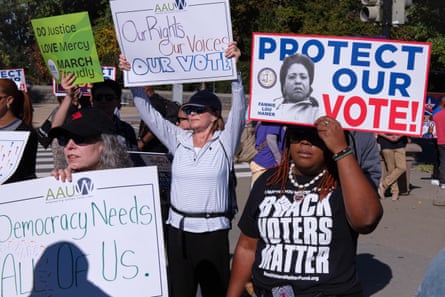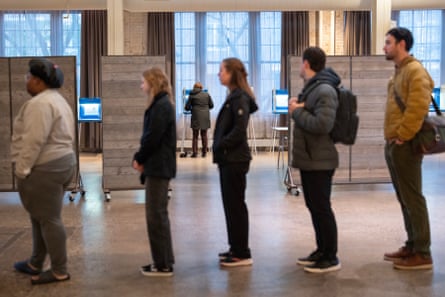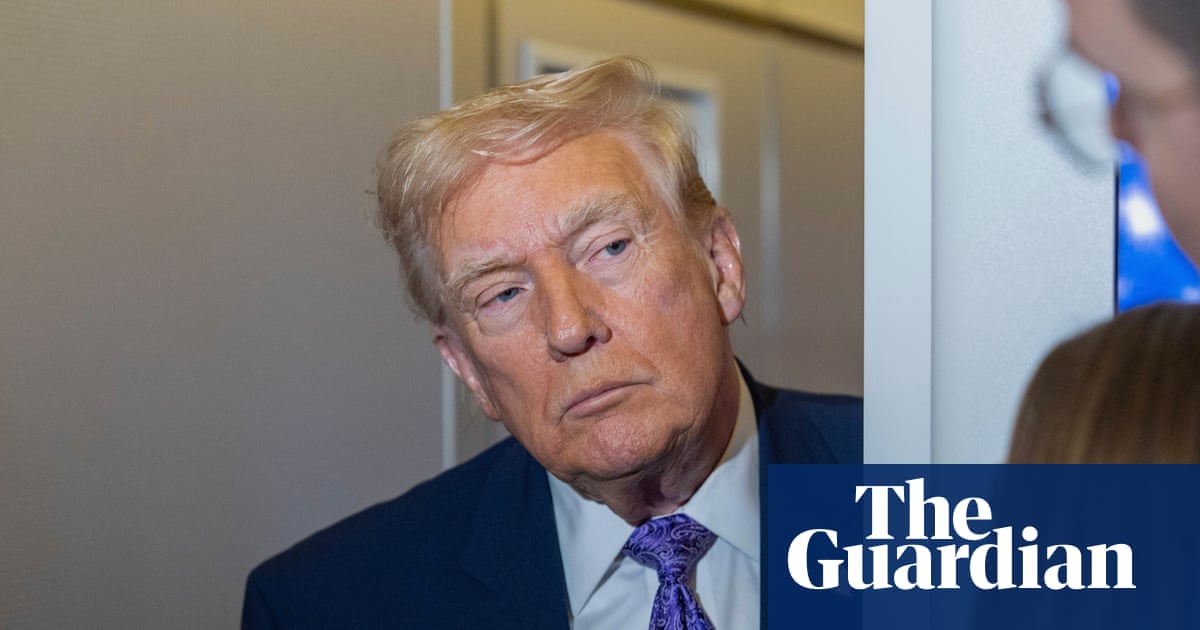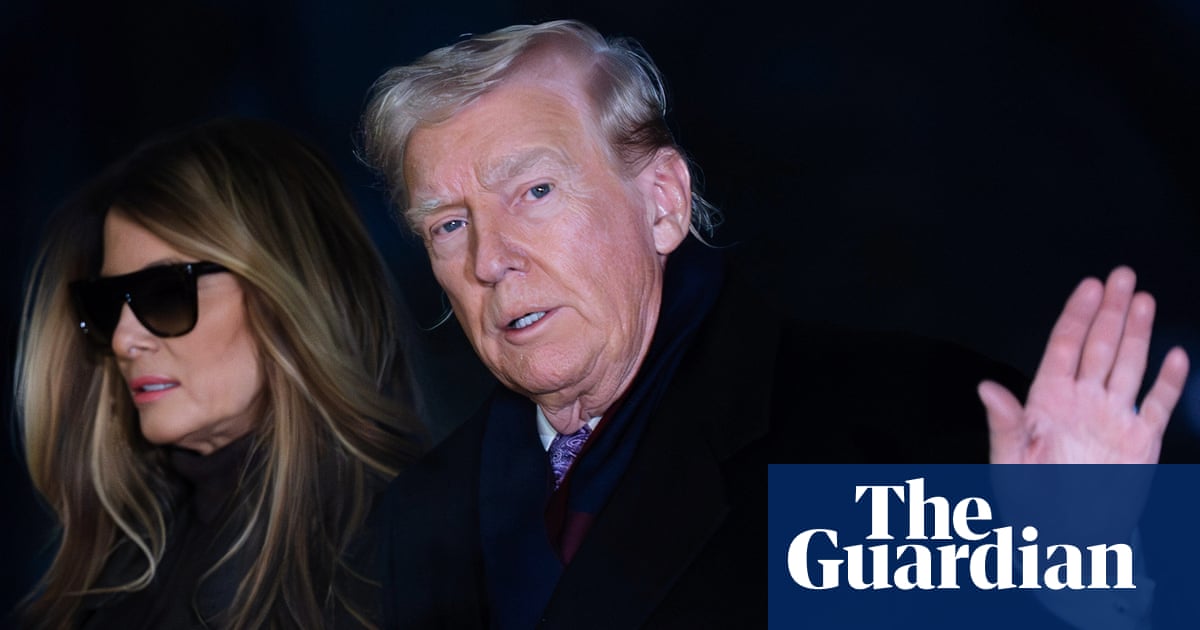A year out from the 2026 midterms, with Republicans feeling the blows from a string of losses in this week’s elections, Donald Trump and his allies are mounting a multipronged attack on almost every aspect of voting in the United States and raising what experts say are troubling questions about the future of one of the world’s oldest democracies.
While Democratic leaders continue to invest their hopes in a “blue wave” to overturn Republican majorities in the House and Senate next year, Trump and some prominent supporters have sought to discredit the possibility that Republicans could lose in a fair fight and are using that premise to justify demands for a drastically different kind of electoral system.
This is not the first time Trump has questioned the credibility of US elections – he did it almost as vigorously in 2016 and 2024, when he won his bids for the White House, as he did in 2020, when he did not – but now the president’s confidants are threatening emergency powers to seize control of a process over which presidents ordinarily have no control.
Trump’s former chief political adviser, Steve Bannon, is urging him to get the elections “squared away” even before the voters have a chance to weigh in. Former legal advisers have suggested the electoral system is in itself an emergency justifying extraordinary intervention, possibly including federal agents and the military stationed outside polling stations.
When Bannon was asked whether voters might find this intimidating, he replied: “You’re damn right.”

The administration itself, meanwhile, is moving on multiple fronts. Most visibly, Trump is pressuring Republican-run states to redraw their congressional maps outside the usual once-a-decade schedule and lock in as many additional safe Republican seats as possible.
Texas has gerrymandered an additional five GOP seats, Ohio two, and Missouri and North Carolina one each, and other states are considering whether to follow suit. (California voters, in response, have just approved a map promising five additional Democratic seats.)
Meanwhile, the justice department has abandoned its decades-long defense of voting rights, and in some instances – notably, a pending supreme court case that risks erasing a key provision of the 1965 Voting Rights Act – has switched to the side arguing against protecting minority rights. The Department of Homeland Security has slashed funding and cut staff at an agency dedicated to protecting elections from physical and cybersecurity threats.
The administration is also demanding states hand over sensitive voter data and purge voter rolls, despite grave concerns about this deterring or disenfranchising large numbers of legitimate voters. In an executive order issued in March, the White House said it wants voters to produce birth certificates or passports as proof of eligibility. It wants the vote count to be over on election night, disregarding provisional and late mail-in ballots. In fact, Trump would like to do away with mail-in balloting altogether.

If all that doesn’t suffice – if Democrats still threaten to prevail next year – the administration has a multi-agency infrastructure set up to trumpet allegations of voter fraud and threaten legal action, including possible criminal prosecution of poll workers, election administrators, political adversaries and individual voters. “We’re going to come after the people … who helped Joe Biden rig presidential elections,” Kash Patel, now FBI director, vowed in the run-up to the 2024 race. (No court has ever substantiated Trump’s claims that Biden was not the rightful winner in 2020.) “Whether it’s criminally or civilly, we’ll figure that out.”
Another possibility is that Trump will seek to wrest control of voting machines from state and local officials, as he came close to doing five years ago.
“Those of us engaged in this fight are witnessing a wholesale attack on free and fair elections,” said Marc Elias, a prominent election lawyer involved in more than 60 suits against the government. “From executive orders to budget cuts, the Trump administration is undermining election security and promoting voter disenfranchisement.”
Perhaps the biggest underlying fear is that Trump has no interest in democracy and aims, ultimately, to destroy it. “I don’t think Donald Trump wants another election,” California’s Democratic governor, Gavin Newsom, opined as Trump invoked legally questionable emergency powers to deploy national guard troops to US cities.
Administration officials insist their concern is to prevent cheating by the Democrats and improve electoral security. But on the campaign trail last year, Trump told evangelical Christian supporters they would need to vote for him only one more time. “Four more years, you know what, it’ll be fixed,” he said. “We’ll have it fixed so good, you’re not gonna have to vote.”
Whatever the ultimate goal, the question uppermost in the minds of many voting rights advocates is how much Trump and his allies will be able to pull off over the next 12 months. The president has almost no power over elections under the constitution, and much of what the administration has advocated is being challenged in court. It is, for example, a federal crime to deploy troops at any election site. Voter intimidation of any kind is similarly prohibited.
For that reason, advocates and lawyers say, the risk is less about what Trump is allowed to do and more about what he can persuade people to do anyway.

“Donald Trump is a marketing machine, and what he is doing right now is marketing power he does not have,” said Justin Levitt, a lawyer who served as a senior adviser on voting rights in the Biden administration. He described Trump’s March executive order, with its demands for strict voter identification procedures and new voting equipment standards, as just “a piece of paper with a scrawly signature on it”. (A federal judge recently blocked the order, saying the president was improperly asserting powers the constitution assigned to Congress and the states.)
“It’s an attempt to fool people,” Levitt added. “Trump’s primary power is the power we give him when he asserts he is in control of everything, and we believe him.”
Jasleen Singh, a lawyer with the Brennan Center for Justice, has no doubt Trump is “directing, dismantling and weaponizing agencies” with the ultimate goal of “election subversion”. But she, too, said it was important not to give in to the force of Trump’s personality.
“The law is on our side,” she said. “We have the right to vote. We have the right to participate … Part of this is not letting voters forget the power that they have.”
The White House had no specific comment about Trump’s actions or intentions. Deputy press secretary Abigail Jackson limited herself to a crack about “Newscum” – Trump’s favored term of abuse for the California governor – and his “doomed-to-fail” (but unannounced) presidential campaign.
Resisting Trump’s pull is proving easier said than done. On a variety of seemingly settled issues – from district maps to the grace period granted for postal ballots to reach their destination – Republican state legislatures have either reversed their own decisions or are considering doing so because of instructions from the White House. “States are under enormous pressure to do what they can to pacify this incredibly vindictive administration,” said Elisabeth Frost, a partner with Elias’s election law group.
Election administrators have expressed widespread fears of doxing and physical threats, and many hundreds have quit their jobs under the pressure. The Maga movement has encouraged supporters to run for election offices to influence the process from the inside.
In a worst-case scenario, voting rights activists say, Trump would win the rhetorical battle and convince large numbers of Americans that voter rolls are corrupted and ineligible voters are casting ballots in large numbers. He could thus muster support for the emergency intervention his allies are pushing for.
after newsletter promotion
The administration certainly seized on this week’s elections to keep beating the rhetorical drum. The justice department sent federal monitors to California and New Jersey, which some local officials saw as intimidation. Trump called the California ballot initiative a “giant scam”. And New Jersey’s US attorney, Alina Habba, put out a video vowing to prosecute a long list of virtually nonexistent election-related crimes.

Experts still said they thought that invoking a national emergency remained a remote possibility. More likely, they said, was a continuation of the pressure campaign to suppress votes and cast doubt on results Trump does not like. They expected the administration to continue to push legal limits first and deal with any blowback from the courts after.
“Everyone is seeing the polls,” Frost, the Elias Law Group lawyer, said. “Literally none of their policies are popular, so they are terrified of this election. The more Trump can say that the vote count can’t be trusted, the more it serves his purpose … Either voters will be repressed by laws or they will be repressed by misinformation and made-up bombastic nonsense.”
Marpheen Chann, a Cambodian American advocate in Maine, has seen first-hand how pressure from the Trump administration – and, in particular, demands for sensitive personal data in the state’s voting records – has deterred community members from participating next November.
“Personally, I’m concerned because I’m politically active. I’m a Democrat,” Chann said. “Will I end up on a list?”
What is true for him, a community leader with a law degree, runs even deeper through the membership of his organization, Khmer Maine. Many either experienced the 1970s Cambodian genocide first-hand or have been traumatized by it across generations, making them particularly sensitive to any hint of authoritarian behavior. “The fact that the federal government is trying to break into our voting data and violate our privacy definitely does not feel good for the community,” Chann said.
Top of mind is the fear that immigration enforcement agents might seek to use inconsistencies in the data – a missing birth certificate, or a mismatch between a birth name and a name on a passport, both of which are issues for Chann – as a pretext to pursue even naturalized citizens for arrest and deportation. Regardless of how justified those fears are, Chann said they are vivid enough to scare people away from civic engagement. “It makes it really hard for me to get people participating and making their voices heard,” he said. “If they make their voices heard, they feel they’re going to be targeted.”
In some parts of the country, Republican state legislatures have needed no pressure from the administration to suppress votes – they have been tightening voter ID requirements, cutting early voting hours, restricting voter registration drives and reducing the number of polling stations for the past 20 years. In other places, though, they have done Trump’s bidding even though it offers them little or no partisan advantage.
Kansans, for example, recently voted to get rid of a three-day window for mail-in ballots to be counted after election day, even though the mail is notoriously slow there and mail-in voting is popular in rural areas, where voters tend to be conservative.
Frost, who is part of a lawsuit to reinstate the three-day window, agreed that Trump’s personal animus against mail-in voting was not necessarily aligned with Republican partisan interests. Still, she saw a political advantage for Trump in demonizing parts of the electoral system.
“The same way he’s been painting the Oval Office with gaudy gold adornments,” Frost said, “he’s been trying to pre-paint all these conspiracy theories so if the election doesn’t go the way he wants, he and his allies can point to the sea of litigation they’ve triggered, or they can point back to the March executive order, and say these were things that should have been done to begin with.”
To counter the chaos and the conspiracies, voting rights groups have most often turned to lawsuits and have been heartened to see lower courts, at least, blocking crucial parts of the Trump agenda. Increasingly, they have also seen judges reprimand political appointees arguing on behalf of the justice department following a wave of career lawyers being fired or resigning.
“The quality of lawyering they are doing now is, in a word, garbage,” Levitt, the former Biden official, said. “You’re going to see the [justice department] lose a lot of cases, and these are cases they should lose.”

In the voter data lawsuits, for example, government filings have repeated far-right talking points – and the language of Trump’s executive order – about voter rolls being vulnerable to “illegal voting, discrimination, fraud, and other forms of malfeasance and error”. That assertion flies in the face of mainstream research going back decades that shows it is passingly rare for ineligible voters to cast a ballot.
“This tells you a lot about what the [justice department] is willing to endorse,” Frost said. “There are not going to be arguments too wild as we get deeper into the election cycle and we start to see other conspiracy theories float to the top.”
Chann, the Cambodian American advocate, worried that facts and the law would not be enough to protect voting rights, especially in immigrant communities. “Even though people I trust in local and state government are saying they’re doing what they can,” he said, “that doesn’t give me any consolation when it comes to whether the federal government will obey its own election and voting laws.”
Still, Chann acknowledged that legal avenues were the best hope for holding on to democracy, and he did not hesitate in coming forward as a named defendant seeking to keep the federal government at bay in a lawsuit over Maine’s voter data.
“Congress isn’t going to do anything, and the executive branch is overreaching,” he said. “We need to make our last stand in the courts.”

 German (DE)
German (DE)  English (US)
English (US)  Spanish (ES)
Spanish (ES)  French (FR)
French (FR)  Hindi (IN)
Hindi (IN)  Italian (IT)
Italian (IT)  Russian (RU)
Russian (RU)  3 weeks ago
3 weeks ago
























Comments